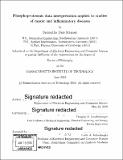Phosphoproteomic data interpretation applied to studies of cancer and inflammatory diseases
Author(s)
Strasser, Samantha Dale.
Download1124762001-MIT.pdf (28.67Mb)
Other Contributors
Massachusetts Institute of Technology. Department of Electrical Engineering and Computer Science.
Advisor
Douglas A. Lauffenburger.
Terms of use
Metadata
Show full item recordAbstract
Protein phosphorylation is a process central to cellular signaling. Consequently, targeted interruption or alteration of this process in the context of disease holds the potential for new treatments. Phosphoproteomic data generated by global mass spectrometry (MS) contain high-content information on protein phosphorylation. Nevertheless, the biological function of the vast majority of phosphorylation sites remains unknown. This poses a challenge in drawing meaningful, actionable biological conclusions from this datatype. This thesis presents the development of Substrate-based Kinase Activity Inference, SKAI, a methodology to infer kinase activity from phosphoproteomic data. SKAI first draws upon prior knowledge of kinase-substrate interactions to construct custom lists of kinases and their respective substrate sites, termed kinase-substrate sets. These sets integrate prior knowledge originating from studies of a variety of different organisms (e.g., human, mouse, and rat). This results in more informative and organism specific sets. Kinase inference is carried out by using these sets within the Gene Set Enrichment Analysis (GSEA) framework. To demonstrate its utility, SKAI is applied to global phosphoproteomic data from two disease systems, i.e., in vivo mouse models of inflammatory bowel disease (IBD) and mutant RAS cancers. Results to date have provided new hypotheses for potential therapeutic development, illustrating the utility of SKAI in elucidating new drug target leads for the treatment of disease.
Description
Thesis: Ph. D., Massachusetts Institute of Technology, Department of Electrical Engineering and Computer Science, 2019 Cataloged from PDF version of thesis. Includes bibliographical references (pages 107-121).
Date issued
2019Department
Massachusetts Institute of Technology. Department of Electrical Engineering and Computer SciencePublisher
Massachusetts Institute of Technology
Keywords
Electrical Engineering and Computer Science.